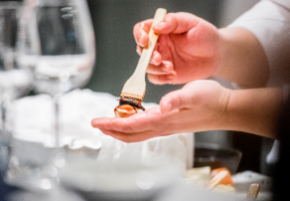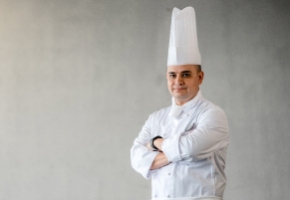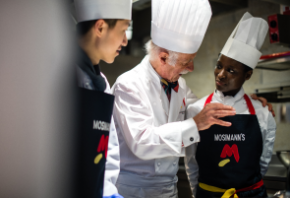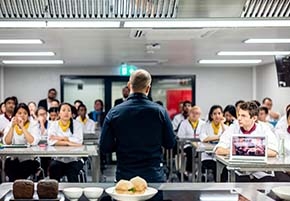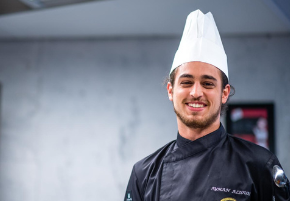- About
- Programs
- Campus Life
- Career Services
- Admissions
- News & Events
- Alumni
Culinary Arts Bachelor's Degree: Careers, Skills and Tips
Explore culinary arts bachelor degrees, career paths, and skills you'll gain. Ready to start your journey? Discover the right program today.
Key Takeaways
- A culinary arts bachelor’s degree provides advanced culinary training, business education, and hands-on experience, preparing students for diverse roles in the food industry.
- Graduates can specialize as executive chefs, pastry chefs, food and beverage managers, and many other roles with a BA in culinary arts.
- The BA in Culinary Arts at CAAS stands out for its strong faculty, industry partnerships, practical training, and scholarship opportunities.
The culinary arts have become an exciting career path for those eager to turn their love of food into a profession. Restaurants, hotels, and luxury resorts continue to seek talented professionals who can create remarkable dining experiences. The demand for chefs and head cooks, among many other roles, is expected to grow by 8% by 2033, making this field a worthwhile area to explore.
It’s important to note that not all culinary schools offer a bachelor’s degree. Many focus solely on diploma programs centered on culinary skills, without the broader education a bachelor’s degree provides. Aspiring chefs who want a well-rounded foundation should choose to pursue a bachelor’s degree in culinary arts, which combines practical training with courses in management, marketing, and other essential areas.
What Is a Culinary Arts Bachelor’s Degree?
A bachelor’s degree in culinary arts combines advanced cooking techniques with business and management training. The Bachelor of Arts in Culinary Arts at Culinary Arts Academy Switzerland (CAAS) is designed for students who want to master both the creative and business sides of the culinary industry.
The program goes beyond learning how to cook by teaching students how to manage kitchens, design menus, and understand the financial and operational aspects of food businesses.
Unlike shorter certificate or associate programs that focus mainly on practical kitchen skills, CAAS bachelor’s degree includes academic courses in hospitality management, entrepreneurship, and food trends, helping graduates step into leadership roles.
Students also gain valuable industry exposure through internships, enhancing their professional experience before graduation.
The degree is ideal for those pursuing long-term careers as executive chefs, restaurant owners, food entrepreneurs, or culinary educators. By combining technical expertise and business knowledge, it equips graduates to shape and innovate the future of the culinary world.
What You Will Learn in a Culinary Arts Program
Start Your Culinary Journey
Learn the art of cooking in a world-class environment
The BA in Culinary Arts at CAAS offers a well-rounded education that blends technical training with academic learning. Students spend time in state-of-the-art kitchens, guided by experienced chefs, while also attending classes that expand their understanding of the food industry.
Key subject areas include:
- Culinary techniques: Mastering advanced cooking methods, plating artistry, and contemporary culinary styles to meet fine-dining standards.
- Food safety and sanitation: Learning international standards for kitchen hygiene and safe food handling practices.
- Concept menu planning and wine pairing: Designing cohesive menus that balance flavor and reflect a restaurant’s identity while thoughtfully pairing dishes with wines to improve the dining experience.
- Nutrition and dietetics: Preparing meals that are flavorful, balanced, and mindful of dietary restrictions, allergies, and food sensitivities.
- Pastry, desserts, and chocolate: Developing technical skills in creating classic and modern sweets, with a focus on precision, presentation, and flavor balance.
- Business: Learning essential skills in business communication, writing business plans, and understanding finance and marketing fundamentals relevant to the culinary and hospitality industries.
This broad mix of expertise is what makes our bachelor’s program so engaging for students, and it produces graduates who stand out to our hiring partners.
Hands-on learning is also a core part of the program. Students work in professional kitchen labs and complete internships with top hotels and restaurants, gaining real-world experience that prepares them for leadership roles in the culinary industry.
The International Recruitment Forum (IRF) is where the magic happens. Many CAAS students have secured internships through this event, which connects culinary students with leaders in the field.
This is how CAAS student Hanna Johansson secured her internship at the Mosimann Collection “on the spot” as a kitchen trainee. She elaborates:
I met Mr. Phillip Mosimann at the International Recruitment Forum in March, 2017. I gave him my CV and he took the time to ask me some questions. On the spot, he told me that he would like to offer me a position at Mosimann’s. A few days later, I received a confirmation by email and I started my internship the following October.
Skills Required to Complete a Culinary BA Program
Success in a culinary bachelor’s program requires more than a love for cooking. Professional kitchens are fast-paced environments where skills like leadership, communication, and stress management are essential.
The culinary arts bachelor’s program at CAAS is designed to help students develop both technical and interpersonal skills that prepare them for these challenges, including:
- Teamwork: Strong collaboration with chefs, servers, and kitchen staff ensures smooth service and a positive working environment, especially during high-pressure shifts.
- Time management: Managing multiple orders, preparation steps, and service deadlines is essential in fast-paced kitchens, and it helps maintain consistency in food quality.
- Creativity: Innovative recipe development, flavor pairing, and visually appealing plating elevate the dining experience and help chefs build a unique culinary style.
- Problem-solving: Quick thinking is necessary to handle unexpected challenges, such as equipment failure, ingredient shortages, or last-minute menu changes.
- Knife skills: Mastering cutting techniques improves speed, efficiency, and presentation, which is especially important in fine dining, where precision matters.
- Kitchen safety: Knowledge of proper equipment handling, hygiene, and food safety practices protects both staff and guests while maintaining professional standards.
At CAAS, students build these skills through real-world training, group projects, and practical workshops. The combination of academic learning and hands-on experience allows them to refine their technical abilities while gaining the confidence to work in professional culinary settings.
For Salman (a CAAS alumnus) and many others, the experience at CAAS goes beyond the classroom, providing the technical knowledge and cross-cultural communication skills needed to excel in today’s demanding culinary environments:
The academy has not only provided me with kitchen and culinary knowledge but has also helped me explore my own identity and embrace different cultures. This education extends beyond academics, as it teaches us to interact and collaborate with people from various backgrounds.
Career Opportunities With a Culinary Arts Degree
A bachelor’s degree in culinary arts provides a pathway to diverse careers in kitchens, hospitality management, and culinary education. Graduates of the BA program at CAAS gain the expertise needed to work in high-end restaurants, luxury hotels, and even corporate food companies.
The blend of technical training and business knowledge equips them for leadership and creative roles across the industry, such as:
Executive chef
Responsible for overseeing kitchen operations, menu creation, and staff management, executive chefs play a key role in shaping a restaurant’s culinary identity. The advanced training at CAAS helps students develop the leadership and organizational skills needed for this demanding position.
Pastry chef
For those passionate about desserts and baked goods, becoming a pastry chef offers a rewarding career. Apart from the BA program, CAAS also offers the Swiss Diploma in Pastry Arts, an excellent option for students who want to specialize further and strengthen their credentials in this field.
Food and beverage (F&B) manager
This role involves managing restaurant or hotel dining operations, controlling budgets, and ensuring top-quality service. The business-focused courses at CAAS provide a strong foundation for this career.
Culinary Instructor
Graduates can teach in culinary schools, vocational institutes, or corporate training programs, passing on professional techniques, kitchen management skills, and industry knowledge to future chefs.
Research and development (R&D) chef
R&D chefs develop new recipes, enhance food products, and experiment with flavors and textures. They often collaborate with restaurants, hotels, or food production companies to introduce innovative menu items and cater to evolving consumer tastes.
How Long Does It Take to Complete a Culinary Arts Degree?
Most culinary arts bachelor’s programs take around four years to complete. However, the BA program at CAAS spans over three years. We believe this timeframe allows students enough time to gain both in-depth culinary training and essential business knowledge, preparing them for advanced roles in the industry.
Our program is unique in that the first year is all about acquiring the foundational skills for your culinary career; the second year focuses on mastering the art of fine dining, while the third year emphasizes leadership skills for aspiring leaders in culinary arts.
Some institutions offer accelerated or part-time options, and certain schools provide online courses for added flexibility. However, CAAS emphasizes practical experience and hands-on learning, making our program ideal for students who want to immerse themselves in professional kitchen environments fully.
The exact duration can also depend on individual circumstances. Internships are an important part of many programs and can extend the timeline slightly, but they provide valuable real-world experience that strengthens career prospects. On the other hand, students transferring from other culinary programs may be able to use transfer credits, which can shorten their study period.
Completing CAAS program within the standard timeframe ensures a well-rounded education, combining theory, practical experience, and industry exposure. By graduation, students are well-prepared to transition into competitive culinary careers confidently.
Tips for Choosing the Right Culinary Program
Selecting the right culinary program is an important step toward building a successful career in the food industry. The best program will provide strong practical training, respected credentials, and valuable industry connections.
The BA in Culinary Arts at CAAS is designed with these qualities in mind, making it a leading choice for aspiring culinary professionals.
Consider the following tips when making your decision:
- Check accreditation and program reputation: A program recognized by respected organizations ensures quality education. CAAS holds the stamp of approval from leading academic and industry partners, which reflects our high standards.
- Look for strong hands-on training and internship opportunities: Practical experience is essential in culinary education. CAAS offers extensive kitchen labs and internships with renowned hotels and restaurants all around the world.
- Evaluate faculty credentials and industry experience: Learning from professionals with real-world expertise enhances your training. CAAS takes pride in its team of highly qualified chefs and industry specialists.
- Research graduate job placement rates and alumni success stories: 97% of our graduates are hired upon graduation, reflecting a strong alumni network and career-focused training that leads to real opportunities in the culinary world.
- Compare tuition costs, scholarships, and financial aid options: Financial support can make education more accessible. CAAS offers various scholarships to eligible students, including the “partner scholarship,” the “merit-based scholarship,” and loans for EU citizens.
- Consider online vs. in-person learning: For practical skills in culinary arts, nothing compares to hands-on, in-person training like that at CAAS. Online programs can be a suitable alternative for students with financial or scheduling constraints.
Where Passion Meets Career
A culinary arts bachelor’s degree builds a strong foundation for a successful career in the food industry. The BA in Culinary Arts at CAAS, in particular, offers advanced culinary training, business-focused education, and valuable industry experience, preparing students for leadership roles in restaurants, hotels, and other culinary settings.
CAAS also offers other outstanding programs, including the MA in Culinary Business Management and the Swiss Diploma in Culinary Arts, providing pathways for further specialization. Students who want to develop their skills and shape a professional future in gastronomy can find the ideal environment to grow at CAAS.
Frequently Asked Questions
Do I need to know how to cook before enrolling in a culinary degree program?
No, beginners are welcome, as most institutions, including CAAS, teach foundational skills from the start.
What’s the difference between a culinary arts degree and a culinary certificate?
A degree offers advanced training with business and management courses, while a certificate focuses mainly on basic cooking techniques.
Interested in becoming a world-class chef? Learn more about Culinary Arts Academy Switzerland. Download our brochure.


